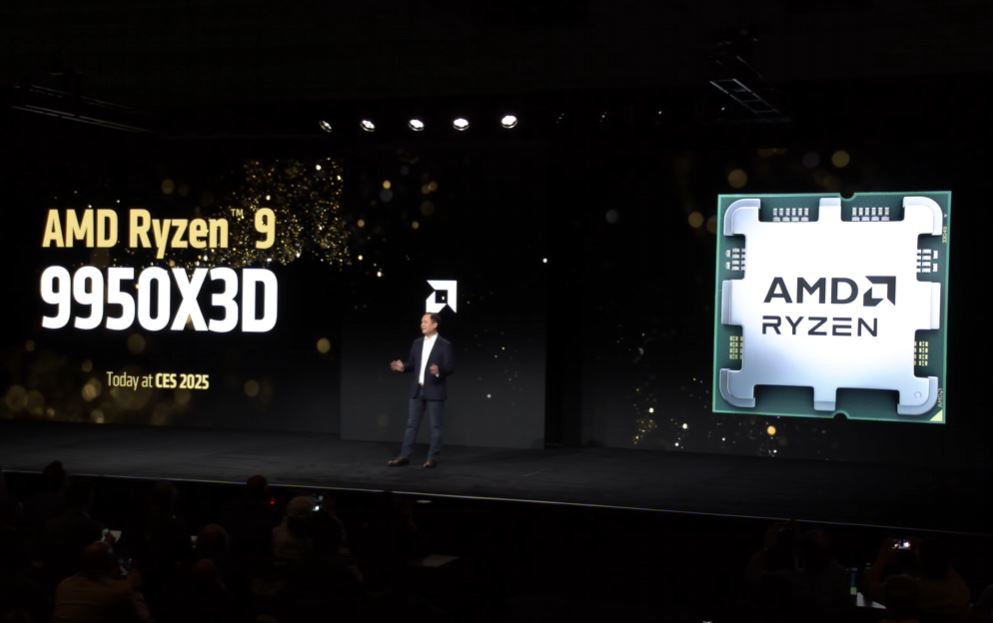
▲CES 2025서 잭 후인(Jack Huynh) AMD 부사장이 발표하고 있다.
라이젠 9950X3D·Z2·9000HX·AI 신규 프로세서 공개
게이머·크리에이터용 프로세서, AI 성능↑ NPU 탑재
CES 2025 개막을 맞이해 글로벌 반도체 메이커들이 자사 신규 프로세서를 대거 공개했다.
AMD가 6일 CES 2025 개막에 앞서 차세대 게이밍과 AI PC용 프로세서를 공개했다. AMD 라이젠 9950X3D·Z2·9000HX 시리즈를 비롯해 라이젠 AI 프로세서 신규 라인업을 소개했다.
데스크톱 게이머들을 위한 라이젠 9950X3D는 16개 젠 5 CPU 코어, AMD RDNA 2 그래픽을 탑재한 제품으로, 2세대 AMD 3D V-캐시 기술을 활용했다. Z2 시리즈는 핸드헬드 게임 프로세서로 5개 젠 5 CPU 코어와 RDNA 3.5 아키텍처 기반 그래픽을 탑재했다. 라이젠 9000HX는 게이밍 노트북용 프로세서로 16코어, 32스레드에 DDR5를 지원한다.
AI PC에서는 프리미엄급 노트북에 고성능 컴퓨팅을 지원하는 라이젠 AI 맥스 시리즈 프로세서, 젠 5 아키텍처 기반 라이젠 AI 300 시리즈 및 기존 젠 4 기반 라이젠 200 시리즈 프로세서를 새롭게 선보였다.
새롭게 선보인 프로세서 제품군은 2025년 상반기부터 출시될 예정으로 델(Dell)과의 새로운 전략적 확장을 통해 AMD 라이젠 AI 프로 기반의 새로운 델 프로 시스템을 올해 말 출시할 계획이다.
차세대 AI PC를 위한 라이젠 AI 맥스 시리즈 프로세서는 일반 사용자를 비롯한 게이머, 크리에이터를 타겟하며, 최대 16개의 젠 5 CPU 코어, 최대 40개의 AMD RDNA 3.5 그래픽 컴퓨팅 유닛, 최대 50TOPS의 AI 처리 능력을 갖춘 AMD XDNA 2 신경망 처리 유닛(NPU)을 탑재했다.
AMD는 50TOPS의 AI 프로세싱을 통해 AI 지원 워크스테이션이나 크리에이터용 소프트웨어 등에서 활용성이 높을 것으로 기대했다.
또한 라이젠 AI 300 시리즈 프로세서 제품군에 새로운 라인업을 추가해 기존에 발표한 라이젠 9 모델 외에 새로운 라이젠 AI 7 및 라이젠 AI 5 프로세서 모델을 추가했다. 프로세서는 최대 8개의 젠 5 CPU 코어 및 최신 RDNA 3.5 그래픽을 탑재하며, AMD XDNA 2 NPU를 탑재해 1세대 NPU 대비 최대 5배 더 뛰어난 AI 성능을 제공한다고 설명했다.
라이젠 AI 7 프로 350 및 라이젠 AI 5 프로 340 프로세서는 차세대 마이크로소프트 코파일럿+를 지원하며 기업 시스템을 AI 활용 가능 인력으로 전환할 수 있도록 지원한다.
AMD는 젠 4 아키텍처에서도 AI 프로세서를 출시하며 하위 라인업에서의 AI 기능 지원을 확대를 도모했다. 라이젠 200 프로 시리즈 모바일 프로세서는 최대 8개의 CPU 코어와 16개의 스레드, AMD RDNA 3 그래픽, 최대 16 TOPS의 NPU 성능을 갖췄다. AI 처리 성능 대비 배터리 수명에 강점이 있는 것으로 강조된다.
잭 후인(Jack Huynh) AMD 부사장은 오프닝에서 “AMD는 고성능 컴퓨팅의 경계를 끊임없이 넓혀 왔으며 일상과 게임에서부터 산업·연구 프로젝트까지 AMD 기술이 확장되고 있다”고 말했다.
한편, AMD 프로 기술은 사용자에게 엔터프라이즈급 관리성 및 다중 계층 보안 기능을 제공해 IT 의사 결정권자가 대규모로 기업 PC를 관리할 수 있도록 지원한다. 최근 클라우드 기반 복구, 공급망 보안 및 추가 감지, 복구 프로세스가 추가됐으며, 기업의 요구 사항을 뛰어넘는 기능을 통해 정교한 공격으로부터 지속적인 보안을 제공한다.